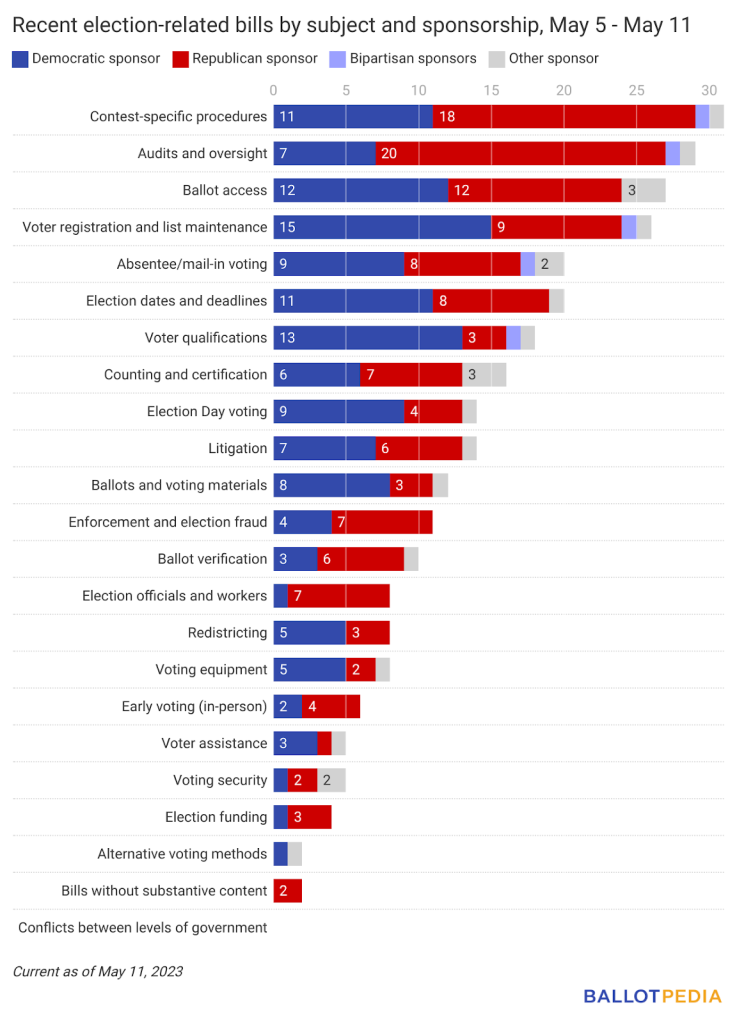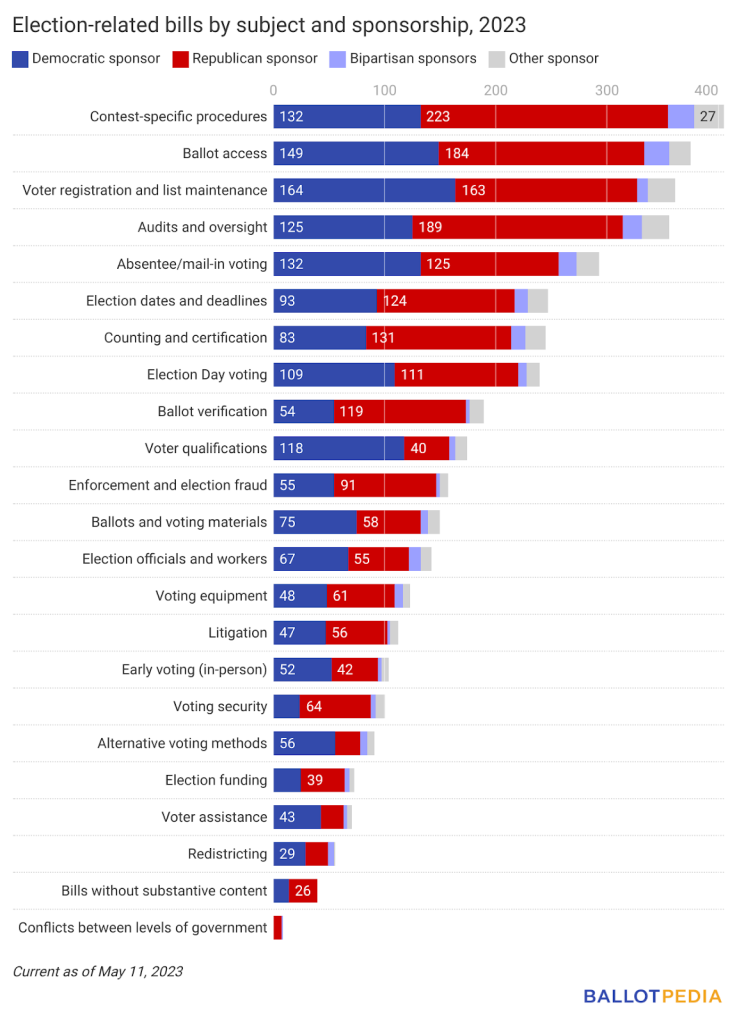Welcome to The Ballot Bulletin: Ballotpedia’s Weekly Digest on Election Administration. Every Friday, we deliver the latest updates on election policy around the country, including legislative activity, nationwide trends, and recent news.
In today’s issue, you’ll find:
- Legislative activity: About the bills acted on this week and a big-picture look at all the bills we have tracked this year.
- Recent news: Noteworthy developments in election policy at the federal, state, and local levels, including litigation and ballot measures.
Legislative activity
State legislatures acted on 148 election-related bills from May 5 to May 11, up from 140 bills the previous week. Of these, 69 either passed one chamber, passed both chambers, were enacted, or were defeated.
Highlights:
- These 148 bills represent 6% of the 2,459 election-related bills introduced in 2023. At this point in 2022, 95 bills had been acted on in some way in the past week, and we were tracking 2,521 election-related bills, 2.5% more than this year.
- Of the 69 bills moving beyond the introductory stage in the past week, five (7.2%) are in Democratic trifecta states, 55 (79.7%) are in Republican trifecta states, and nine (13%) are in a state with a divided government.
- The bill topics with the most legislative activity this week were contest-specific procedures (31), audits and oversight (29), ballot access (27), voter registration and list maintenance (26), and absentee/mail-in voting (20). Contest-specific procedures refers to primary systems, municipal election procedures, recall elections, special election procedures, and other systems unique to a particular election type.
Recent activity and status changes
Of all election-related bills in state legislatures in 2023:
- 134 have been enacted (+18 from last week)
- 31 passed both chambers (-7)
- 207 passed one chamber (+20)
- 2 advanced from committee (No change)
- 1,854 have been introduced (-32)
- 222 are dead (+14)

Enacted bills
States have enacted 134 election-related bills in 2023, 18 more than the 116 bills states had enacted at this point in 2022. Of these 134 bills, Democrats sponsored 21 (15.7%), Republicans sponsored 80 (59.7%), and 17 (12.7%) had bipartisan sponsorship. Committees or legislators with a party affiliation other than Republican or Democrat sponsored the remaining 16 (11.9%) bills. To see all bills approved this year, click here.

Bills enacted since May 5, with their official titles, are listed below.
Minnesota (Democratic trifecta)
- MN HF3: Voter registration provisions modified; absentee voting provisions modified; voting instructions and sample ballot required to be multilingual and interpreters required to be provided; intimidation, deceptive practices, and interference with registration and voting regulated; campaign finance provisions modified; express advocacy definition expanded; penalties provided; reports required; and money appropriated.
Montana (Republican trifecta)
- MT SB143: Allow for a referendum to terminate citizen initiated zoning district
South Carolina (Republican trifecta)
- SC H4099: Lancaster County Precincts
Bills that passed both chambers
Thirty-one bills have passed both chambers (but have not yet been enacted) in 2023, 13 less than 44 bills that had passed both chambers at this point in 2022. To see all bills that have currently passed both chambers, click here.
Active bills that passed both chambers since May 5, with their official titles, are below.
Tennessee (Republican trifecta)
- TN SB1007: AN ACT to amend Tennessee Code Annotated, Title 2, relative to elections.
- TN HB1552: AN ACT to amend Chapter 159 of the Private Acts of 2002; and any other acts amendatory thereto, relative to the charter for the Town of Chapel Hill.
- TN SB0978: AN ACT to amend Tennessee Code Annotated, Title 2, relative to polling places.
Texas (Republican trifecta)
- TX SB2038: Relating to release of an area from a municipality’s extraterritorial jurisdiction by petition or election.
Defeated bills
Two-hundred and twenty-eight bills have been defeated in committee or by a floor vote in 2023, 44 more than the 178 bills that were defeated at this point in 2022. To see all bills that have been defeated in 2023, click here.
Fourteen bills have been defeated since May 5.
Recent activity by topic and sponsorship
The chart below shows the topics of the bills state legislatures acted on since May 5. Click here to see a full list of bill categories and their definitions.

* Note: Contest-specific procedures refers to primary systems, municipal election procedures, recall elections, special election procedures, and other systems unique to a particular election type.
All 2023 bills by topic and sponsorship
The chart below shows the topics of a sample of the 2,459 bills we have tracked this year. Note that the sums of the numbers listed do not equal the total number of bills because some bills deal with multiple topics.

Enacted bills by topic and sponsorship, 2022 vs. 2023

Recent activity by state and trifecta status
Fourty-four (29.7%) of the 148 bills with activity this week are in Democratic trifecta states, 91 (61.5%) are in Republican trifecta states, and 13 (8.8%) are in states with divided governments.
Of the 69 bills moving beyond the introductory stage in the past week, five (7.2%) are in Democratic trifecta states, 55 (79.7%) are in Republican trifecta states, and nine (13%) are in a state with a divided government.
The map below shows election-related bills acted on in the past week by state trifecta status.

All 2023 bills by state and trifecta status
Of the total bills introduced in 2023, 1,050 (42.7%) are in states with Democratic trifectas, 1,116 (45.4%) are in states with Republican trifectas, and 294 (11.9%) are in states with divided governments.
Texas legislators have introduced the most election-related bills this year. Texas holds legislative sessions in odd years only, and so had no activity in 2022. New York was the most active state at this point in 2022. South Dakota has enacted the most bills this year. In 2022, New York and California had enacted the most bills at this point.
The map below shows the number of election-related bills introduced by state in 2023 by state trifecta status.

Recent news
Challenge to Colorado signature verification process moves forward
On May 5, a Colorado 2nd Judicial District Court judge rejected Secretary of State Jena Griswold’s (D) motion to dismiss a challenge to the state’s signature verification system for mail-in ballots. Vet Voice Foundation (VVF), which describes its mission as “combating climate change, protecting voting rights, dispelling toxic disinformation, and ensuring all have access to health care, good careers, and more,” filed the original lawsuit in December of 2022. VVF alleged Colorado’s signature matching requirements disenfranchised voters. Attorneys for the group said that “for the vast majority of Colorado voters who vote by mail, this fundamental right is contingent on an arbitrary, deeply flawed signature matching process. While ostensibly deployed to verify voter identity, signature matching is election integrity theater: it disenfranchises qualified voters by the tens of thousands, all for the appearance—but not the reality—of election integrity.”
District Judge John E. Elliff ruled that “the relief Vet Voice seeks, namely, to enjoin Defendant from utilizing signature verification procedures, does not require individual participation. Defendant’s arguments to the contrary, that Vet Voice must be a membership organization and that it must identify specific members who have been disenfranchised, finds no support in Colorado law …” In a response to the ruling, Griswold’s office said, “This preliminary ruling is on a technical legal procedure question, and does not reflect the court’s judgment of the State’s mail-ballot verification process. The Department of State is confident in our position of protecting Colorado’s voting procedures.”
Federal court rules Kansas election law is unconstitutional
On May 5, a judge for the United States District Court for the District of Kansas ruled that a Kansas law prohibiting out-of-state entities from mailing ballot applications and applications containing pre-filled information was unconstitutional. VoteAmerica, which “uses technology to simplify political engagement, increase voter turnout, and strengthen American democracy for all eligible voters,” and Voter Participation Center, “a non-profit, non-partisan organization dedicated to increasing voter registration,” sued the state over the law, which was enacted through HB2332 in 2021. In her ruling, Judge Kathryn Vratil, a George H.W. Bush (R) appointee, said, “Defendants have not established that the Personalized Application Prohibition is narrowly tailored to achieve the state’s alleged interests in the enhancement of public confidence in the integrity of the electoral process and avoiding fraud, the avoidance of voter confusion or the facilitation of orderly and efficient election administration. The Personalized Application Prohibition cannot withstand strict scrutiny and is therefore an unconstitutional infringement on plaintiff’s First Amendment rights to speech and association.”
In response to the ruling, Tom Lopach, president and CEO of Voter Participation Center, said, “In the 2020 election, we saw firsthand the urgency of vote-by-mail in the midst of the pandemic. That’s why we fought back — to protect Kansans from this assault on our democracy. We will keep working to ensure every American can make their voice heard.” In a 2021 motion to dismiss the case, attorneys for the state said, “Plaintiffs’ claims challenge nondiscriminatory, common-sense measures designed to enhance the public’s confidence in the integrity of our electoral process” and that the lawsuit “fail[s] to present a justiciable case or controversy sufficient to trigger the Court’s subject matter jurisdiction due to their lack of standing, the unripe nature of the claims, and Defendants’ soveriegn immunity.” Attorney General Kris Kobach (R), who was a defendant in the case, said, “We believe that the ruling is incorrect and we intend to appeal.”

